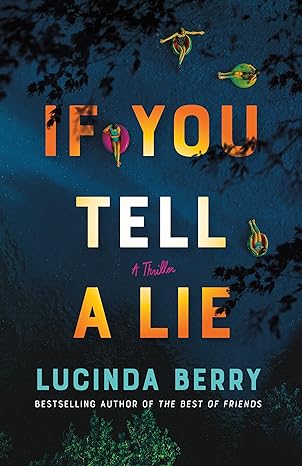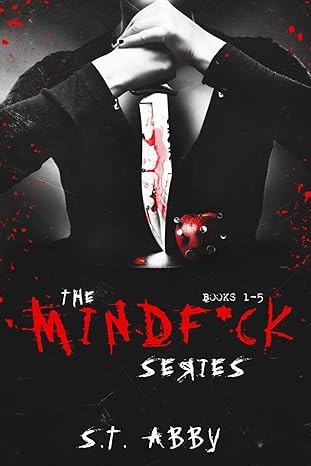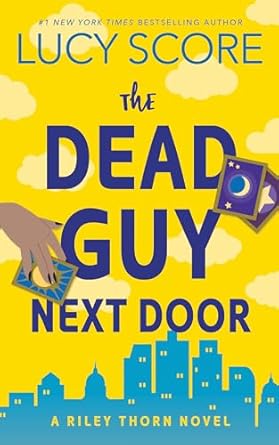Have you ever started reading a book and found yourself zoning out, unsure if it’s the story or your own wandering brain that’s to blame? That was me with Lucinda Berry’s If You Tell a Lie. I belong to the Facebook Group, Psychological Thriller Readers, and have heard many great things about Berry’s storytelling, so I was prepared to be blown away. Honestly though, the first part of the book felt like wading through quicksand. Now, I’ll admit—it might have been me and not the book. Life’s distractions have a way of creeping in when you least want them to, and my brain was clearly having a “buffering” moment.
Now, before I sound like a total buzzkill, let me set the record straight. It wasn’t bad writing—far from it. The opening just felt a little slower than I anticipated, like the story was tiptoeing its way into the action instead of diving in headfirst. To be fair, life probably wasn’t helping my reading experience. My mind was wandering (as it often does), and I found myself re-reading paragraphs just to stay on track. I was tempted to set it aside for another day, but I’m stubborn when it comes to books. I decided to push through. And thank goodness I did.
What Makes If You Tell a Lie a Must-Read for Thriller Fans
Around the 20% mark, everything changed. It was like the story woke up and decided, “Okay, let’s really get this party started.” The characters, who had initially seemed like faint outlines, came to life in vivid detail. Their emotions, their secrets, their choices—they all felt raw and real. Lucinda Berry has this incredible knack for creating flawed, complicated characters who feel like people you might actually know. That relatability sucked me in, and suddenly, I wasn’t just reading a psychological thriller—I was living it alongside them.
As the plot thickened, I found myself clutching this twisty thriller a little tighter with each chapter. Lucinda Berry’s storytelling layered the suspense masterfully, dropping breadcrumbs that led me down one path, only to yank me in a completely different direction. Every time I thought I had it figured out, she threw in a twist that left me scrambling to rethink everything I thought I knew.
And then came the ending. Let me tell you: I pride myself on being a pretty savvy reader. I can usually spot a twist coming from a mile away. But not this time. Berry blindsided me in the best possible way, and I so love that! The ending was so unexpected and so cleverly done that I just sat there, staring at the last page, trying to process what had just happened. It’s rare for a book to completely outsmart me, but If You Tell a Lie managed to do just that.
Article Continued below



https://brashbodyandsoul.etsy.com
Why This Book Stands Out Among 2024’s Best Psychological Thrillers
Reflecting on the experience, I think the slower start served a purpose. It gave me time to get to know the characters and their world, to settle into the story’s rhythm before it cranked up the intensity. By the time the twists started coming, I was fully invested. The payoff wouldn’t have been as satisfying if the author hadn’t taken the time to build a solid foundation first.
I think what makes this book stand out in the top psychological thrillers of 2024 is its exploration of secrets and lies—the ones we tell others and the ones we tell ourselves. The author digs down into the nitty gritty of the psychological toll of deception, showing how it fractures relationships and distorts reality. It’s a reminder that the truth, no matter how painful, is always lurking just beneath the surface, waiting to be uncovered. Annnnnd who doesn’t love books with shocking endings?
Would I recommend this book? Absolutely, but with a small caveat: be patient. The beginning might feel like a slow burn, but once the story catches fire, it’s impossible to put down. If you’re a fan of psychological thrillers with well-crafted characters and jaw-dropping twists, If You Tell a Lie is worth every minute of your time. Just when you think you’ve got it all figured out, Lucinda Berry comes along and pulls the rug out from under you—and you’ll love every second of it.
If you still need to grab your copy of this great title, you can get it here on Amazon. Or get it for free when you sign up for a free trial from Audible. Until next time, my bookish besties, keep it brash, keep it bookish, and keep it true to you!
If you loved the twists in If You Tell a Lie, check out my review of The House Across the Lake by Riley Sager.
No matter if you’re in a mondo sized book club or if it is just a book club for one, here are some discussion topics for If You Tell a Lie.
Discussion Questions for Book Clubs
If You Tell a Lie by Lucinda Berry
- I found the beginning of If You Tell a Lie to be a slower start. How did you feel about the pacing? Do you think it added to or detracted from the overall experience of the story?
- Which character did you find the most compelling, and why? Did your opinion of any character change as the story unfolded?
- The story takes a deep dive into the impact of lies—both big and small. How did the lies told by the characters affect their relationships? Have you ever experienced a situation where a lie, even a seemingly harmless one, spiraled out of control?
- Lucinda Berry is known for her plot twists. Did you see the ending coming? If not, which twist surprised you the most, and why?
- How did Berry’s portrayal of the psychological impact of secrets resonate with you? Do you think the characters’ actions were believable given their circumstances?
- Did any character’s decisions leave you questioning what you would do in their situation? Were there moments where you found yourself empathizing with a character despite their questionable actions?
- The book explores different dynamics—family, friendship, and romantic. Which relationship stood out to you the most, and what did it reveal about the characters involved?
- How did the setting influence the tone and progression of the story? Do you think the same plot would have worked in a different environment?
- How do you interpret the title, If You Tell a Lie? In what ways does it encapsulate the book’s central message or themes?
- After reading the book, what lessons or insights did you take away about truth, trust, or human behavior? Did it change how you view the consequences of deception?




